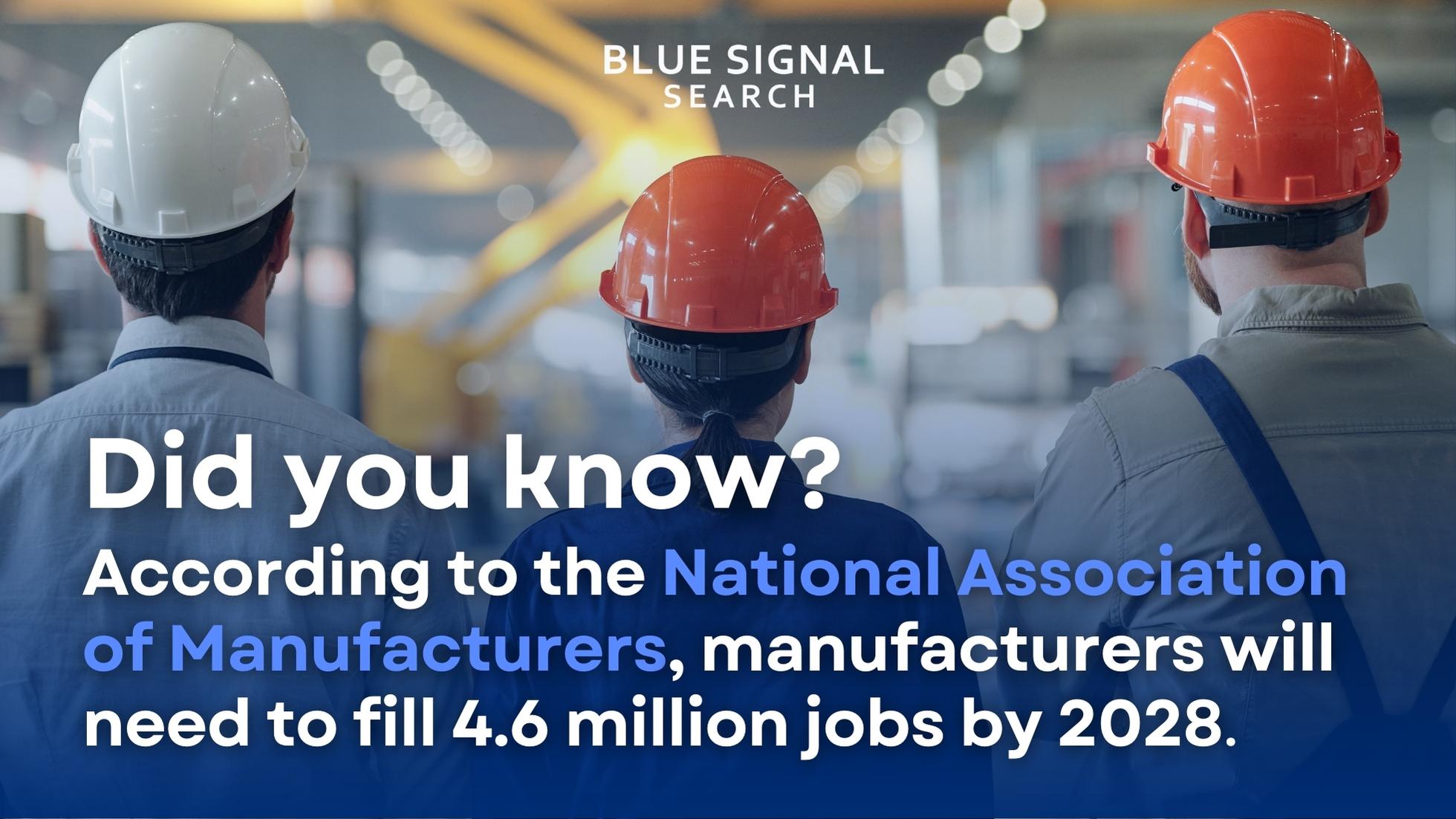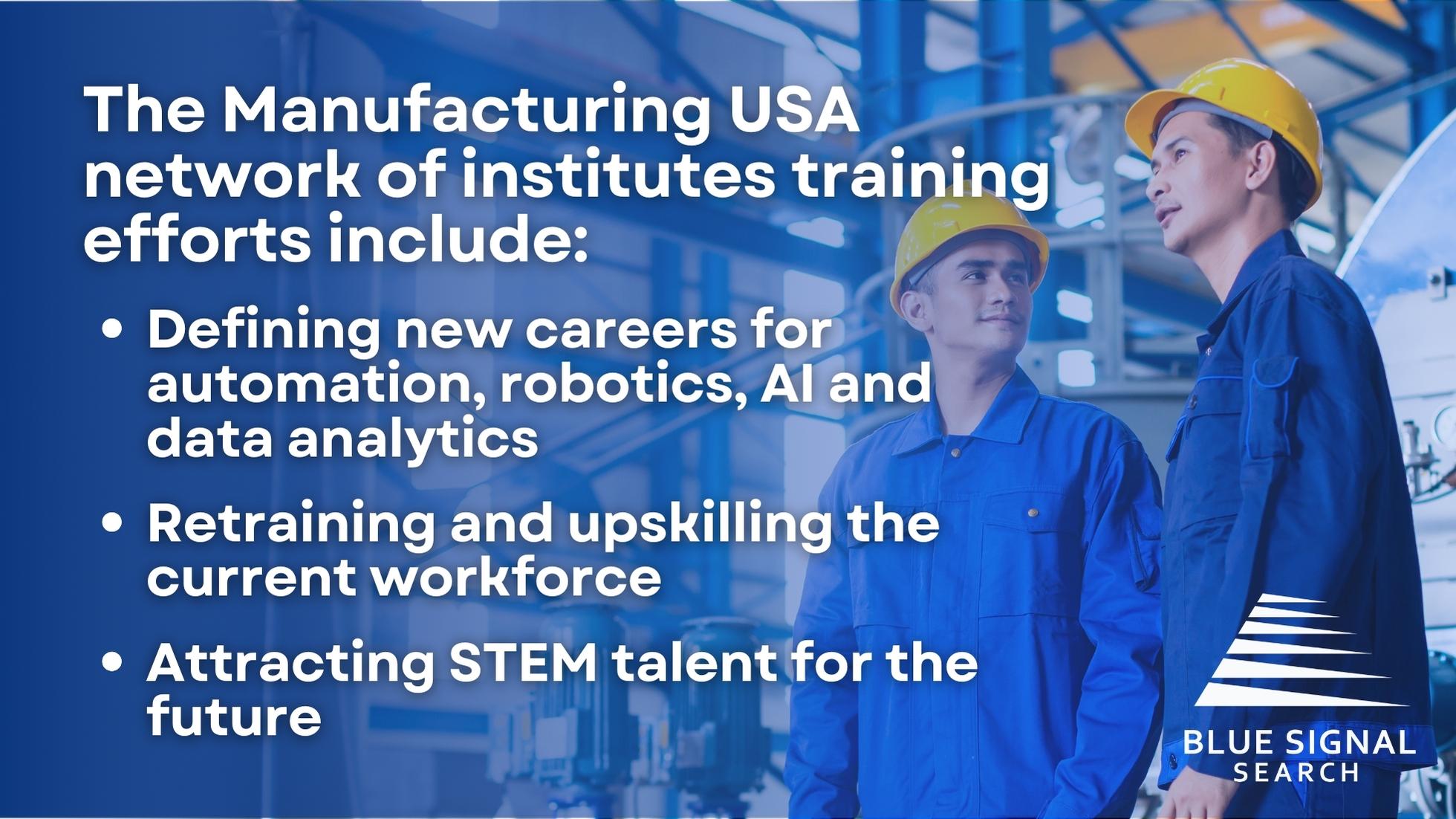In the ever-evolving manufacturing workforce, staying ahead is key. As the industry undergoes rapid changes, this blog will serve as your roadmap, offering valuable insights into evolving skill requirements and career opportunities for both hiring managers and job seekers in the field. It will guide you through the latest trends in manufacturing, the critical need for upskilling and reskilling, and the invaluable role of recruiting companies in shaping a resilient workforce. Blue Signal Search's manufacturing recruiting practice is equipped with the expertise to assist you on this transformative journey, helping you make informed decisions and navigate your path effectively.
Understanding the Manufacturing Workforce Evolution
The manufacturing workforce evolution is a dynamic landscape shaped by innovation and automation, driven by technological advancements and globalization. However, it also poses challenges, with the skills gap looming large as a pressing concern affecting companies of all sizes

According to the National Association of Manufacturers, manufacturers will need to fill 4.6 million jobs by 2028, underscoring the disconnect between the current workforce's skills and the demands of advanced manufacturing. Additionally, there's a perception gap regarding today's manufacturing industry, which often fails to highlight its dynamic, high-tech, and rewarding aspects.
Upskilling and Reskilling: Strategies and Importance
To thrive in this evolving manufacturing landscape, upskilling and reskilling are imperative. In the context of manufacturing, upskilling enhances employees' existing skills, while reskilling equips them with entirely new ones. These strategies are not only advantageous for employees seeking growth but also for employers looking to maintain a competitive edge. Successful upskilling and reskilling programs abound, demonstrate their effectiveness

To address the skills gap, the Manufacturing USA network of institutes is at the forefront of reshaping career paths in automation, robotics, AI, and data analytics. Their focus extends to retraining and upskilling the existing workforce while enticing STEM talent for the future. Through strategic collaborations with educational institutions and industry partners, these initiatives generate interest in manufacturing careers and equip workers with essential skills.
Challenges in Implementing Upskilling and Reskilling
Implementing upskilling and reskilling strategies is a crucial step in navigating the manufacturing workforce evolution. However, it comes with its fair share of challenges. Here are some common hurdles and effective solutions:
Budget Constraints:
- Solution: Allocate resources strategically by prioritizing critical skill gaps and investing in high-impact training programs. Seek external funding opportunities or partnerships to supplement the budget.
Resistance to Change:
- Solution: Foster a culture of openness and adaptability within the organization. Communicate the benefits of upskilling and reskilling clearly to employees, emphasizing how it contributes to their career growth and the company's competitiveness.
Limited Time for Training:
- Solution: Implement flexible training schedules, including online and on-the-job training, to accommodate employees' work commitments. Break down training into smaller, digestible modules for easier integration into daily routines.
Manufacturing companies can overcome these challenges by embracing a culture of continuous learning and development. By prioritizing skill enhancement, organizations not only adapt to the evolving landscape but also create a motivated and skilled workforce prepared for the future.
The Role of Recruiting Companies in Workforce Development
Enter recruiting companies, valuable partners in workforce development. Collaborating with firms, like Blue Signal, can be a game-changer for hiring managers and companies navigating the manufacturing workforce evolution. They specialize in identifying and attracting top talent, making the hiring process more efficient and effective. The benefits of such collaboration are vast, streamlining recruitment efforts and ensuring a skilled workforce.
Blue Signal’s Manufacturing Recruiting Practice
Consider reaching out to Blue Signal's Manufacturing Recruiting Practice, your ally in this competitive hiring journey. Our team specializes in connecting manufacturing companies with the right talent, facilitating seamless adaptation to the evolving industry. Explore partnership opportunities with us to ensure your workforce remains agile and competitive.
Conclusion
In summary, the manufacturing workforce evolution is an ongoing transformation that demands attention and action. Upskilling and reskilling are the keys to success in this ever-changing environment. Embracing these strategies and partnering with recruiting firms like Blue Signal can empower your company to thrive amidst the challenges and opportunities of the evolving manufacturing workforce. Take proactive steps, invest in your workforce, and secure your future in the manufacturing industry.
Meet Stephanie Viboch
Stephanie Viboch, a Blue Signal expert recruiter, is dedicated to connecting candidates with opportunities that drive their careers forward. She specializes in recruiting talent for manufacturing, plastics, accounting & finance, and more! Stephanie is committed to helping candidates achieve their professional goals and find fulfilling job opportunities. Her expertise and dedication make her an invaluable asset in navigating the evolving manufacturing workforce. Connect with Stephanie to unlock your potential in the industry.
Partner with us for your next hire.
Set up a free consultation with a recruiting manager. Tell us about your hiring need.
By submitting this form, you consent to receive communications from Blue Signal, including phone calls, emails, and text messages.

